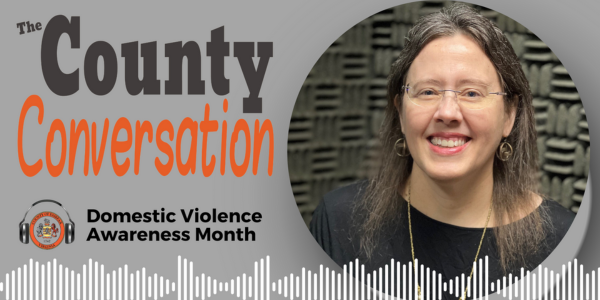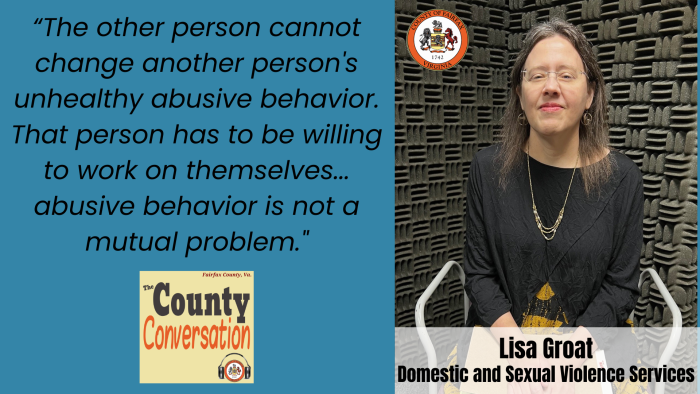
October marks Domestic Violence Awareness Month, a time to shine a light on an issue that affects people across all walks of life.
Lisa Groat, a senior behavioral health specialist from Fairfax County’s Domestic and Sexual Violence Services (DSVS) Clinical Services team, recently sat down to talk about domestic violence awareness and what makes a relationship healthy.
“Domestic violence is something that affects everyone. It’s all socioeconomic classes, races, ethnicities. If you haven’t experienced yourself, you know someone who has,” Groat explained.
While October traditionally highlights this issue, DSVS is working to spread awareness throughout the entire year.
Breaking Down Common Myths
One of the biggest misconceptions about domestic violence is that it only happens in certain communities or economic classes. Some people believe that wealthy areas like Fairfax County don’t struggle with domestic abuse, but unfortunately that is not true.
Another myth?
That only men abuse their partners. DSVS offers programs for people of all genders who cause harm in relationships. Abuse happens across all sexual orientations and gender identities.
How to Support Someone Experiencing Abuse
If someone you care about is dealing with domestic or sexual violence, you might feel helpless. But there are ways you can help.
First, share the 24-hour hotline: 703-360-7273. You can also point them to fairfaxcounty.gov, where they can find domestic and sexual violence resources, including shelters and counseling services.
Here’s what not to do: Don’t tell them to “just leave.” Leaving is often the most dangerous time for someone in an abusive relationship. This is a decision only they can make.
“It’s something, it’s a decision that only the person who’s in that can take because they’re the one who are risking their life perhaps by leaving. So please don’t tell the person, you have to get out of the relationship,” Groat stressed.
Another mistake people make is cutting off communication when they get tired of hearing about the abuse. This puts the person in more danger. Keep the lines of communication open. Your support matters more than you know.
Red Flags: Warning Signs of an Unhealthy Relationship
Knowing what to look for can help you spot trouble early — either in your own relationship or someone else’s.
Two of the biggest red flags are jealousy and controlling behavior. These often disguise themselves as love, especially early in a relationship. Someone who texts constantly, gets angry when you don’t respond immediately or doesn’t want you spending time with friends isn’t showing love — they’re showing control.
Other warning signs include:
- Speaking badly about all their exes
- Not respecting your boundaries or pressuring you after you say no
- Making you feel like you can’t be yourself
- Making you afraid to express opinions that differ from theirs
- Making you feel unsafe or worried about making them angry
If someone talks negatively about past partners or blames others for relationship failures, pay attention.
What Self-Esteem Has to Do with It
Self-esteem plays a huge role in relationship health. If you don’t value yourself, you’re less likely to value your partner. You’re also more vulnerable to accepting abuse. Healthy relationships build self-esteem. Unhealthy ones tear it down.

Green Flags: What Makes a Relationship Healthy
So, what should you look for in a healthy relationship? Here are the key ingredients:
Safety and Authenticity
You should feel safe — both physically and emotionally. You should be able to be your true self without fear of judgment or punishment.
Healthy Communication
Communication style matters. Assertive communication means expressing what you need without hurting the other person. Use “I” statements instead of “you” statements.
Emotional Regulation
Both people should be able to manage their emotions in healthy ways. Anger is normal, but expressing it through yelling, insults, throwing things, or violence is not okay.
Respect for Boundaries
Each person’s boundaries deserve respect. This includes time boundaries, emotional boundaries and physical boundaries.
Honesty and Trust
Partners should be honest with each other. That said, everyone deserves some privacy. Demanding to see your partner’s phone or monitor their social media shows a lack of trust and crosses into controlling behavior.
Equality
Decisions should be made together, not by one person. No one should feel coerced or pressured into giving in. This goes beyond splitting chores — it’s about equal say in the relationship.
Mutual Support
Both people should support each other’s goals, friendships and interests. A healthy partner encourages you to spend time with friends and pursue your own hobbies.
Appreciation and Gratitude
Show gratitude for the little things. There’s even a “magic ratio” for healthy relationships: five positive interactions for every negative one. A positive interaction could be a hug, a thank you or any small gesture that shows you care.
Resources and Help
If you or someone you know needs help:
- 24-Hour Hotline: 703-360-7273
- Online resources
- ADAPT Program: For people who recognize they’re causing harm in their relationships (can be court-ordered or self-referred)
- Free Counseling: Available through the county for people who have experienced domestic violence as children or have been in abusive relationships
If you’re in immediate danger, call 9-1-1.
The County Conversation Podcast
The “County Conversation” is a podcast featuring employees and subject matter experts from the Fairfax County Government discussing programs, services and items of interest to residents of Fairfax County. Listen to past episodes of “County Conversation.” To find other county podcasts, visit www.fairfaxcounty.gov/podcasts.



 SIGN UP FOR DAILY EMAIL HEADLINES
SIGN UP FOR DAILY EMAIL HEADLINES